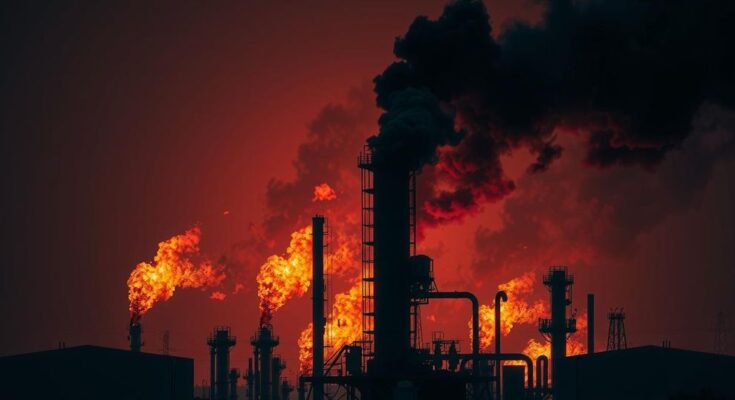Fighting in Sudan has led to significant damage to the al-Jaili oil refinery, with satellite imagery revealing extensive fires and thick smoke emissions. Accusations have flown between the Sudanese military and the RSF regarding the origins of the fires. The destruction of this key facility poses severe economic challenges for both Sudan and South Sudan amid ongoing humanitarian crises. International concerns continue to mount over the escalation of violence and its impacts on civilians.
Recent satellite imagery indicates that fighting surrounding Sudan’s largest oil refinery has ignited fires across the facility, which is located approximately 60 kilometers north of Khartoum. This complex, jointly owned by Sudan’s government and the China National Petroleum Corporation, has seen intensified hostilities since the onset of the civil war between the Sudanese military, led by General Abdel-Fattah Burhan, and the rebel group Rapid Support Forces (RSF).
The RSF has claimed control of the refinery since April 2023, erecting landmines to deter military advances. Despite prior attacks, the refinery had largely remained operational until recent hostilities escalated, leading to extensive damage. Satellite images displayed flames engulfing the facility, with thick smoke rising toward the capital, prompting health concerns over respiratory issues and cancer risk due to smoke inhalation.
Official statements exchanged blame for the fires, with the Sudanese military accusing the RSF of deliberately setting the refinery ablaze to undermine national infrastructure. Conversely, the RSF alleged that the military had bombed the facility, destroying it entirely. Both sides failed to provide supporting evidence for their claims, as gunfire was heard amidst the reported seizure of the refinery by military forces.
The implications of this destruction are significant; it would severely impact the economies of both Sudan and South Sudan. Analysts warn that losing the refinery could lead to increased dependence on costly fuel imports, exacerbating the humanitarian crisis triggered by ongoing conflict. The situation is further complicated by international reactions, with the UN Secretary-General expressing concern over potential economic and environmental consequences.
Sudan has been in turmoil since the removal of long-time dictator Omar al-Bashir in 2019, followed by a military coup in October 2021 led by Burhan and RSF General Mohammed Hamdan Dagalo. Over 28,000 fatalities and widespread displacement have marked the conflict since April 2023, raising alarms over humanitarian needs.
The civil war in Sudan has escalated since April 2023, creating a humanitarian crisis marked by widespread violence and economic devastation. The al-Jaili oil refinery, a crucial facility for the country’s oil production, has become a strategic point of contention between the Sudanese military and the RSF. Efforts by international entities to mediate and prevent further violence have largely failed, with combatants exhibiting extreme measures against each other and the populace. The conflict has roots in decades of political instability, making it a complex and critical issue with implications for regional stability.
The ongoing conflict in Sudan has reached a critical juncture with the destruction of the largest oil refinery, illustrating the severe ramifications on both national infrastructure and the humanitarian situation. As military forces continue to clash, the repercussions for civilian populations grow increasingly dire, demanding urgent attention from the international community to prevent further deterioration. The situation highlights the fragility of Sudanese governance and the urgent need for lasting solutions to foster stability and peace in the region.
Original Source: www.cnn.com




